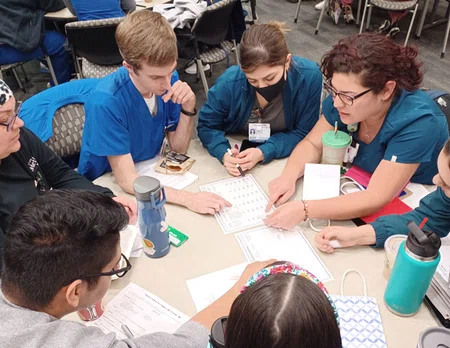© 2023. Houston Methodist, Houston, TX. All rights reserved.


In this
issue

WELCOME
NURSING SCIENCE

Implementation Science in Nursing: Let’s Do The Thing!

Project Approval Process

Systems-based physical assessments: Earlier detection of clinical deterioration and reduced mortality
EDUCATION

Houston Methodist Nurse Residency Program: Empowering Newly Licensed Nurses

The Center for Nursing Research, Education, and Practice Multimedia Team
PRACTICE

Introduction to Chief Nursing Informatics Officer

Revitalizing CVICU Orientation: Charting New Milestones for Excellence
PROFESSIONAL DEVELOPMENT

Certification Review Courses

International Honor Society of Nursing

Nursing Certification Payment Programs at Houston Methodist
FROM OUR TEAMS

ABOUT DISCOVERN
PRACTICE
Revitalizing CVICU Orientation: Charting New Milestones for Excellence
By Courtney Cromer, MS, BSN, RN, CCRN
By Courtney Cromer, MS, BSN, RN, CCRN

Nursing is a rapidly changing profession known for its fast pace and adaptability. Nurses are often known as the heart of medicine. However, how can we better prepare our new nurses in their orientation to ensure they are happy and competent? Nursing faces a shortage due to patient demand, burn-out, and the exit of tenured nurses from the bedside.
Our unit, the Cardiovascular Intensive Care Unit (CVICU), experienced a high turnover rate along with the hiring of newly graduated nurses. Surveys and interviews with new and experienced staff demonstrated that the current methods utilized to orient new nurses were not sufficient, and there was still a significant knowledge gap and lack of competency as orientation progressed. If new staff needed to change preceptors, there was no consistent measure of their skill level and competence. Lastly, we found that many new staff felt it would be beneficial to have more resources that could be utilized after the initial orientation process was complete.
Our unit leadership determined that approximately 15% of new staff to the unit have CVICU experience, 50% have ICU experience, and the remaining are either recent graduates or those transitioning to critical care. To promote nurse retention, comfort and proficiency, as well as collegiality among nurses, we examined our orientation practices. In response we completely changed the educational material provided to new staff, which included:
- Milestones (based on experience)
- Preceptor Quick Guide
- Provider list with images
- Charting Guidelines and How-To’s
- Surgical- and Surgeon-specific Guidelines
- Commonly used drips
- Report Sheets,
- Monitoring Device Guides
- Unit Protocols
- 57% of the respondents stated the new material would be more useful in practice;
- 79% rated the information and organization as excellent, user-friendly and straightforward.
- 100% noted that the milestones and information were valuable.
- The overall survey rating was 4.82/5.
References:
Heydari A., Kareshki H., Armat M.R. Is nurses’ professional competence related to their personality and emotional intelligence? A cross-sectional study. J Caring Sci. 2016;5(2):121–132. doi: 10.15171/jcs.2016.013.
Innes, T., & Calleja, P. (2018). Transition support for new graduate and Novice Nurses in Critical Care Settings: An integrative review of the literature. Nurse Education in Practice, 30, 62–72. https://doi.org/10.1016/j.nepr.2018.03.001
Joswiak ME. Transforming Orientation Through a Tiered Skills Acquisition Model. J Nurses Prof Dev. 2018 May/Jun;34(3):118-122. doi: 10.1097/NND.0000000000000439. PMID: 29715203.
Joswiak, M. E. (2018). Transforming orientation through a tiered skills acquisition model. Journal for Nurses in Professional Development, 34(3), 118–122. https://doi.org/10.1097/nnd.0000000000000439
Kjelland, K., Allen, M., Holder, K., Jenny, A., Roe, C., Troutman, H., Nieves, H., Voils, T., & Monroe, M. (2021). The tiered skills acquisition model. Nursing Management, 52(9), 51–53. https://doi.org/10.1097/01.numa.0000771756.09339.e2
Kozub E, Hibanada-Laserna M, Harget G, Ecoff L. Redesigning Orientation in an Intensive Care Unit Using 2 Theoretical Models. AACN Adv Crit Care. 2015 Jul-Sep;26(3):204-14. doi: 10.1097/NCI.0000000000000088. PMID: 26200727.
Lalithabai DS, Ammar WM, Alghamdi KS, Aboshaiqah AE. Using action research to evaluate a nursing orientation program in a multicultural acute healthcare setting. Int J Nurs Sci. 2021 Jan 21;8(2):181-189. doi: 10.1016/j.ijnss.2021.01.002. PMID: 33997132; PMCID: PMC8105551.
Langley, Tamra M.; Dority, Jeremy; Fraser, Justin F.; Hatton, Kevin W.. A Comprehensive Onboarding and Orientation Plan for Neurocritical Care Advanced Practice Providers. Journal of Neuroscience Nursing 50(3):p 157-160, June 2018. | DOI: 10.1097/JNN.0000000000000359
Lawton, J. S., Tamis-Holland, J. E., Bangalore, S., Beckie, T. M., Bischoff, J. M., Bittl, J. A., Cohen, M. G., DiMaio, J. M., Don, C. W., Fremes, S. E., Gaudino, M. F., Goldberger, Z. D., Grant, M. C., Jaswal, J. B., Kurlansky, P. A., Mehran, R.,
Metkus, T. S., Jr, Nnacheta, L. C., Rao, S. V.,. Zwischenberger, B. A. (2021). 2021 ACC/AHA/SCAI Guideline for Coronary Artery Revascularization: A Report of the American College of Cardiology/American Heart Association Joint Committee on Clinical Practice Guidelines. Circulation, 145(3), e18-e114. https://doi.org/10.1161/CIR.0000000000001038
Purcell, T. (2019, April 1). Redesigning the way we educate nurses. Clinical Solutions. Retrieved August 15, 2023, from https://www.elsevier.com/clinical-solutions/insights/resources/insights-articles/nursing/orientation-and-retention/redesigning-the-way-we-educate-new-nurses
Slimmer, K. A., Melnychuk, E., Schoenwetter, D. J., Chaudhury, A. S., & Slimmer, S. J. (2022). Development, implementation, and assessment of a new competency and outcomes-based orientation in an air medical transport program. Air Medical Journal, 41(1), 63–67. https://doi.org/10.1016/j.amj.2021.07.009









